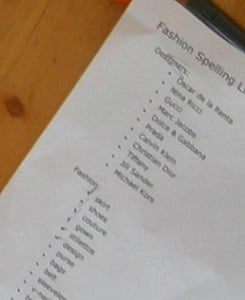Natural Vocabulary Development
The quickest way to grow as an educated person is to master the vocabulary of a particular field. That really is what we mean when we say people are “educated.” They know the verbiage that goes with that field, they know the people who comment and write about it, they know the critical players in the field (whatever field of expertise they are in—inventors or football stars!), and they know especially the language of the specific domain.
For instance, your kids are often expert in a particular video or computer game. When they talk about it, don’t you feel a little out of your depth? That’s because your kids are experts and you are a mere novice! On the other hand, your knowledge of a particular area (birth? tennis? art history? literature? gardening?) trumps your kids’ I’m sure!
The point is this—growth as an educated person is all about mastery of language and how it relates to a specific field. The more you read, the more nuances you’ll master. It’s one thing to say: “What a pretty night sky” (a novice’s appraisal) and another to say, “There’s Cassiopeia! It’s a constellation in the northern sky, named after the queen Cassiopeia from Greek mythology. You can recognize it by its unique ‘W’ shape and how it’s formed by five bright stars. See it?”
The tendency in homeschool is to overvalue “academic” vocabulary and to under-appreciate the vocabulary your children naturally acquire in their areas of “common” interest. For instance, you want to claim “genius status” for the kid who loves astronomy, but you overlook the child whose enthusiasm for fashion makes her an expert in fabrics, necklines, and designers. Yet the exact same set of skills goes into “expertise” for both. Both of these fields offer your child the opportunity to deepen a vocabulary around a particular field of interest. Knowing the language, the insider-jargon, the methods for evaluation for whatever research is being done, the successes and failures in the field, the “celebrated persons,” the career opportunities that go with that field—all of these lead to a level of competence in that subject domain that empowers your child to be “smart.”
The mastery of a particular area of interest leads to the ability to replicate that style of inquiry for other areas later in life (both personal interest and academic). Not only that, you can use your child’s natural interests now, for spelling, grammar, writing style, and exploration in a way you can’t conjure with bored children being dragged through history or science that doesn’t engage them.
When my daughter, Caitrin, spent several years deeply invested in fashion, we made spelling lists of words that were particular to that field. Words like couture, stilettos, boutique, sleeveless.
Caitrin kept a daily blog for a year writing about fashion and modeling her individual outfits each day. We took a trip to Chicago to see the stores of designers she had studied in her magazine subscriptions (Vogue, Elle, etc.). We watched Project Runway with religious regularity.
Caitrin acquired a vocabulary far superior to mine in that arena and we used her passion for that field to learn about how you take a subject area deeper. She is less interested in fashion today, but as she focuses on what she loves, she finds the names, ideas, and language that go with those subject areas because she knows (instinctively) that that’s how you demonstrate intelligence and credibility when you talk about any subject.
Try it! You’ll like it.



















